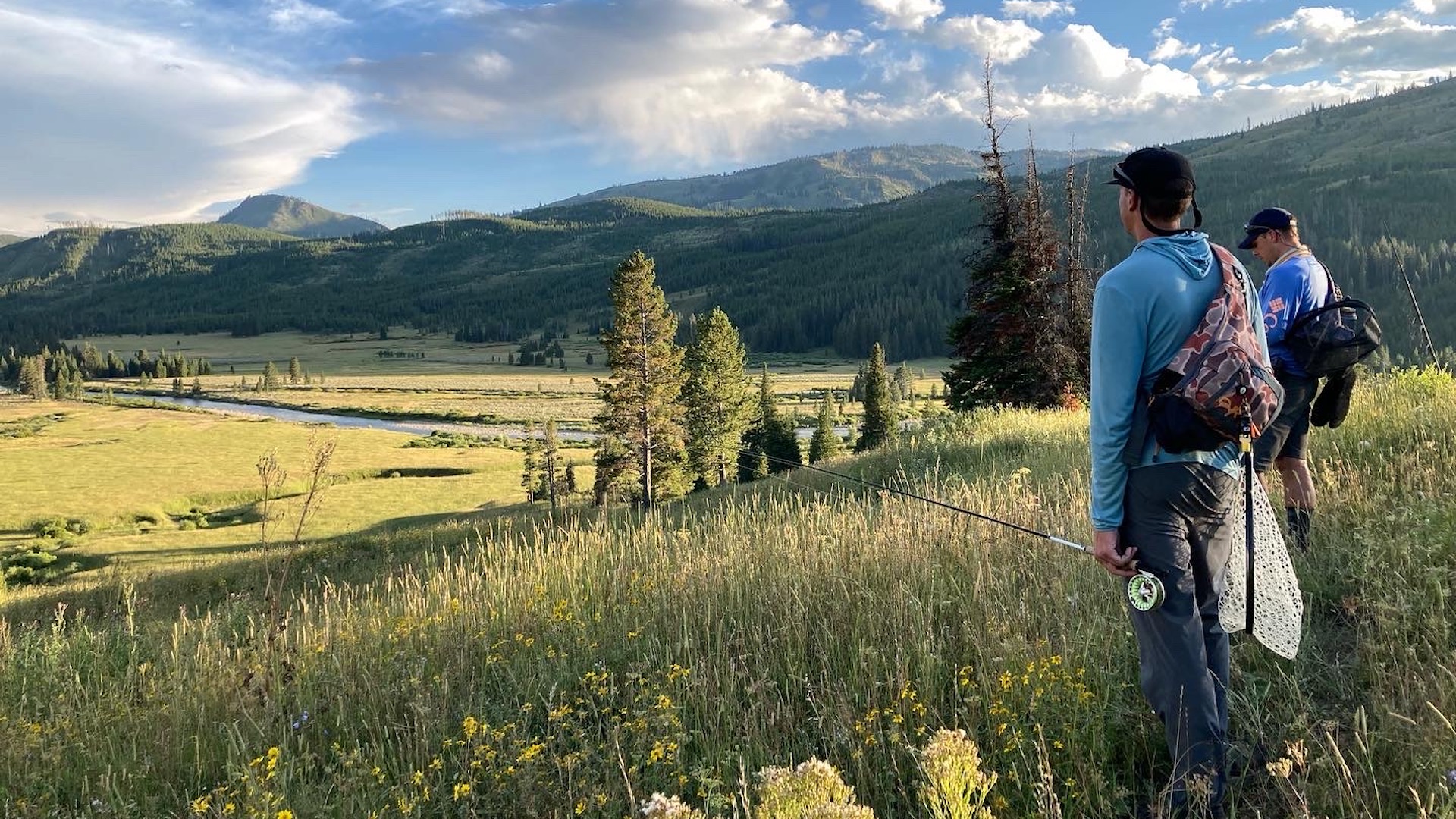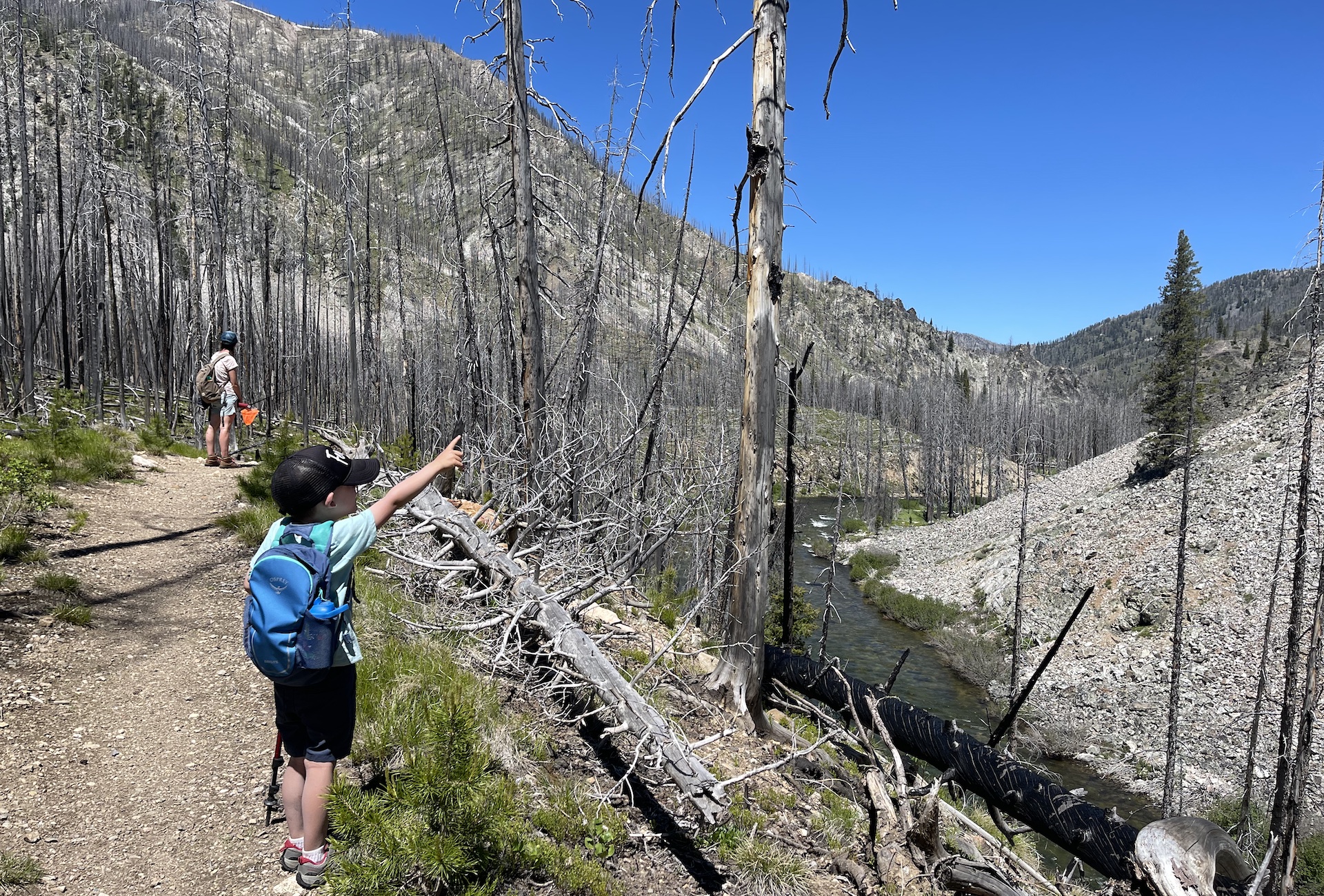
Summer trout fishing shut down in rivers across the West because of dangerously warm water temperatures. Ice fishing seasons have come and gone without safe ice. Elk hunts are canceled because of ever-worsening wildfires. Moose populations plummet from tick infestation. Droughts crushing whitetail food plot dreams yet again and inciting recurring nightmares of EHD. Warming lake and ocean waters fueling extreme algal blooms and fish die-offs. Millions of acres of forest are wiped out by perpetually growing swarms of bark beetles.
This is our reality today. The world we’re handing off to my sons and maybe your children too.
As a hunter or angler in the 2020s, it’s becoming increasingly hard to head afield and not notice the impacts of the changing climate. The question of whether this climate change thing is an overblown political hoax has passed. The idea that it’s a hypothetical crisis coming far in the future now seems quaint. A 2022 national poll of hunters and anglers by the TRCP confirms this realization even within the hook and bullet community, with more than 70% of respondents recognizing that climate change is happening.
It’s here. Right now. Changing our woods and waters and wetlands and wild places. If you can erase from your mind whatever the partisan talking heads have told you, whether from left or right, and simply open your eyes, you can’t help but see it.
The last eight years have been the world’s hottest in recorded history. And while there have been other significant warming periods in the history of the earth, these have played out over the course of thousands if not millions of years. Our situation has unspooled in about 50. It’s unprecedented. And it’s sure to continue impacting fish and wildlife populations, the wild landscapes they call home, and our opportunities to pursue them.
But what can we do about it?
It’s easy to imagine that this is a problem above any of our pay grades. Climate disruption is a worldwide phenomenon that can seemingly only be addressed by global policy and humankind-scale system changes (many of which are politically fraught). But that’s not necessarily the case. In fact, scientists and conservationists both are finding that the very natural systems and wild places that hunters and anglers have long stewarded can actually play an important role in defending against and reversing the effects of climate change.
Known as “nature-based climate solutions,” these common-sense habitat protection and restoration efforts represent a true win-win opportunity for hunters, anglers, and the natural world by addressing the climate crisis in the long term while also directly benefiting fish, wildlife, and outdoor recreation in the interim.

What Are Nature-Based Climate Solutions?
A nature-based climate solution is the use of some kind of natural landscape or ecosystem (either by protecting, restoring, or creating it) to minimize the impacts of climate change or remove carbon from the atmosphere that contributes to further warming.
The climate disruption we’re already experiencing today (and the much more dramatic warming expected in the future) is caused by a human-influenced, unnaturally fast increase of carbon being released into the atmosphere, mostly in the form of carbon dioxide, which then reflects heat back down to the earth like the glass of a greenhouse. Earth has historically managed and balanced the natural releases of carbon into the atmosphere (when plants or animals die, volcanic eruptions, etc.) through a series of natural “sinks” that take carbon back out of the atmosphere. Forests, grasslands, wetlands, and even the ocean all function in this way.
The first set of nature-based solutions are those that reinforce, restore, or increase the scale of these natural carbon sinks. More simply, these projects protect or restore more of the stuff that sucks carbon out of the air. Reforesting a burned national forest or protecting old-growth trees. Preserving intact grasslands and shifting from traditional grazing practices to a rotational model that improves the health of previously deteriorated prairies. Investing in the restoration of coastal ecosystems by protecting or fostering new mangrove or kelp forests. All of the above can lead to massive amounts of carbon being pulled from the sky and stored in the earth and its living exoskeleton.
The second set of nature-based solutions are those that utilize nature to adapt to or reduce the damage caused by climate change impacts like sea-level rise, flooding, increasingly severe hurricanes and storm systems, drought, and wildfires. In essence, these efforts use one form of nature to buffer us from another. The protection or restoration of wetlands to absorb flood and storm damage. Restoring dunes, beaches, and “living shorelines” to act as natural seawalls. The implementation of regenerative agriculture practices to reduce soil moisture loss, erosion, and drought vulnerability. Creating streambank enhancements to reduce the risk of river erosion and flooding.

How Will These Impact Hunters and Anglers?
All of the above, and many other similar nature-based solutions, are wins in the long-term effort to reduce the carbon load entering the atmosphere and defend our current way of life from a shifting climate. But examine any of these projects in isolation, and you’ll also see immediate and direct benefits to hunting, fishing, and wildlife.
Restoring prairie ecosystems in Nebraska or Kansas or North Dakota? That’s going to benefit pheasants and other upland species, mule deer, pollinators, and countless other birds. Not to mention anyone who enjoys hunting amidst these sprawling and beautifully nostalgic landscapes.
The installation of new oyster reefs, mangrove forests, and restoration of barrier islands? Redfish, bonefish, snook, and a whole host of sea mammals and birds ought to enjoy that, along with thousands of coastal anglers.
Reclaiming abandoned mine sites in states like West Virginia, Kentucky, and Pennsylvania? That’s going to help whitetail deer, black bears, elk, turkeys, and, oh yea, a whole lot of big game hunters too.
In essence, nature-based climate solutions represent the continuation of the wildlife habitat work that hunters and anglers have been advocating and working on for decades, but now with the added benefit of addressing the larger worldwide challenge of climate change. And with this added scope comes the benefit of vast new sources of funding being directed toward tackling the climate challenge. For example, the Inflation Reduction Act of 2022 (the largest climate-focused bill in US history) includes $200 million for vegetation management efforts on National Forest lands and another $2.6 billion for the NOAA to protect coastal and marine habitats and resources. This kind of much-needed funding for habitat work could go a long way toward addressing the climate crisis but also the many other challenges facing fish and wildlife in America.

How Can We Contribute?
So what can hunters and anglers do? We can act as advocates for action on climate change with a common-sense first step of championing nature-based solutions as part of the solution.
Through emails and phone calls to our representatives in congress, our participation in in-person events and rallies, social media posts, op-eds, and financial donations we can bring attention to the benefits of these projects that address both climate mitigation/resilience and wildlife habitat, and we can help drive funding and approval of these efforts.
Secondly, we can actually get out there on the ground or in the water to implement nature-based climate solutions ourselves. Volunteering time to plant trees on public land, seeding native grasses on a whitetail property, participating in a wetland restoration project or river clean-up - all of these projects and more can help. Hunters and anglers have led the charge, volunteering for on-the-ground habitat work for years. It only makes sense that we continue that, especially now that our impact can ripple out farther than ever before.
And, finally, we can bear witness to the changes we’re seeing across our wild lands. Few people in America have more opportunity to see, feel, and experience the effects of climate change than those of us who spend countless days, weeks, and months of our every year exploring the natural world in pursuit of fish and game. Our voices and real-life on-the-ground observations can help drag this issue out of the realm of partisan politics and into the real world of decent common-sense people who simply want to solve a problem.

Our Future
The climate is rapidly changing. It’s an inconvenient reality that many of us are now coming to terms with and with this change will come further dramatic impacts to the fish, wildlife, and wild places we hunters and anglers care so much about. We now have a choice.
We can stick our heads in the sand and cry “fake news!” We can scream and point fingers at politicians or big businesses. We can be paralyzed by the eye-popping scale of the problem and throw our hands in the air, saying, “what can I possibly do!” Or, we can instead choose to take action, one generous step at a time. A phone call to a senator. A conversation with a friend. A tree or ten planted behind the house. A volunteer day on the stream.
Nature-based climate solutions are a common-sense first step towards a better future for wildlife and wild places, our hunting and angling traditions, and the entirety of mankind. Funny that by simply getting out of the way and letting nature do what it does best, we might begin to work our way out of this most monumental man-made crisis.






Conversation